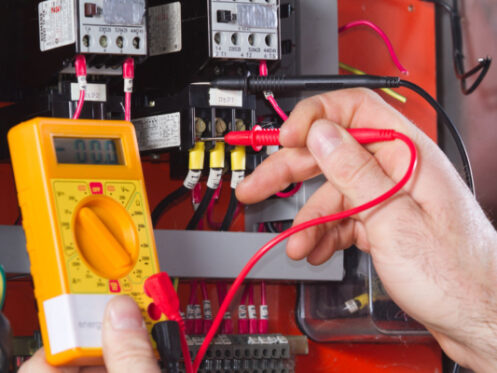According to recent research, faulty wiring and electrical equipment are among the most common causes of home fires. Although scheduling an electrical inspection for your residence might not be something you consider regularly, it can save you a lot of money by helping to prevent fire damage to your residential property and other belongings.
Experts recommend scheduling an electrical system evaluation yearly, but it depends on the type of residence. How often you schedule an inspection also depends on different factors since each homeowner has unique requirements and needs for their electrical equipment and systems.
A professional inspection ensures your electrical systems, appliances, and wiring meets safety regulations. However, sometimes electrical problems can go unnoticed until they become serious safety hazards or result in costly repairs. Here are eight tell-tale signs that your residential property needs electrical inspection.
1. Burning Odors
One of the common signs of electrical problems in a home is burning odors. Although it is normal for newly-installed home appliances to emit unfamiliar smells, electrical panels, fuse boxes, and electrical outlets should not emit odors. If you detect a burning smell in your house, try to identify the source. If you can’t locate it, your wiring might be the culprit.
Burning odors indicate a problem that requires immediate action to prevent electrical fires. Many electrical wires are encased in plastic insulation. Therefore, the burning odor is a warning sign your wiring is heating up, making the plastic covers melt. Before calling your local electrician, unplug all devices and appliances from the sockets and avoid using your switches and electrical outlets.
2. Hot Sockets and Switches
Like burning smells, you should not ignore any heat energy from your home’s electrical wiring, outlets, or switches. It’s normal to have warm spots sometimes, especially when you plug an appliance or device into an electrical socket. However, if the socket becomes extremely hot, call your electrician to check it and fix the problem.
Sometimes one or more electrical outlets may become hot even when you have not plugged any appliances or gadgets into them. Hot sockets and switches indicate a wiring problem that requires professional help. Stop using those electrical sockets and have a licensed electrician inspect your home’s wiring to determine the root cause of the problem.
3. Flickering Lights
Dimming or flickering of your lighting fixture is rarely due to faults in the fixtures. The problem is mainly caused by gadgets or appliances using the same circuit. For instance, an energy-hungry appliance such as a space heater or hair dryer can draw excessive power, causing your lights to flicker or dim. Call your electrician to check and test the circuit and appliance.
Depending on the condition of the circuit, the professional can move the lighting to another circuit or install a dedicated circuit for heavy-duty appliances. They can also ensure that energy-consuming appliances and devices have the appropriate protection and power supply.
4. Wrong Type of Outlet
All power outlets aren’t the same for every room in your residential property. Rooms or parts of your house with some water supplies, like bathrooms and kitchens, need different power outlets from other areas. That’s because water is an electrical conductor, which can be hazardous in case of an electrical fault.
The special outlets used in such areas are called ground fault circuit interrupters. It is easy to recognize these electrical outlets because they have two central switches. If your kitchen or shower room outlets resemble those in your other rooms, you need to have them checked and replaced by an experienced technician.
5. Strange Noises
Electrical circuits do not produce noise during operation. The common causes of strange noises are defective appliances, faulty wiring, and loose connections. Although low and steady humming or buzzing in home appliances or devices is normal, you should not ignore loud crackling or sizzling noises. Unplug the appliance or device immediately and have your electrician inspect it before using it again.
If the noises are coming from a light switch or power outlet, electrical currents might be skipping gaps across loose connections. However, if the noises are coming from your walls, frayed wires might be the culprit. The solution to electrical noises may range from easy tasks like changing your electrical outlets to complex jobs such as rewiring the entire house.
6. Many Extension Cords
Utilizing many extension cords indicates that there are an insufficient number of outlets in your home. Likewise, having several appliances and devices running from a single multi-socket indicates inadequate power outlets. Although using electrical cords to power an appliance or equipment temporarily is okay, it’s not a safe way to power household appliances.
Using many extension cords can cause twisted cords, poor connections, and electrical shorting. Besides, the extension cords can get in the way, resulting in trips and falls. Do you depend on many electrical extensions to power your devices and home appliances? If yes, it is time to have an experienced electrician evaluate your electrical system and install more electrical outlets.
7. Loose Switches and Power Outlets
Electrical outlets, switches, and wires may change over time. The wiring behind outlets and switches may get worn out and loosen up. The main problem with loose switches or outlets is that they can easily catch fire, especially if they are still being used. If you notice loose switches, wires, or sockets in your residential property, stop using them and call your electrical contractor to schedule an electrical inspection as soon as possible.
8. A Tripping Circuit Breaker
Circuit breakers are designed to protect your home and household appliances. These devices trip when the power load is too high. Tripping often prevents an electrical overload and may also protect against electrical fires. If your home’s circuit breaker trips more often when you turn on a specific appliance, the appliance may be defective. However, if the breaker trips when you use a certain outlet, it can signify an overloaded circuit.
Circuit breakers can also trip due to faulty or malfunctioning outlets. If this problem persists, talk to a licensed electrician. These professionals can thoroughly inspect your home’s electrical system and provide valuable recommendations. If the wiring is faulty or you’ve got an old and broken circuit breaker, the electrician might recommend replacing the circuit breaker or upgrading the wiring system.
Partner With the Electrical Experts!
If you have noticed any of these signs, don’t hesitate to call our experts at Huft Home Services. Our team of certified and experienced electricians can handle many different types of residential projects relating to indoor and outdoor lighting, electrical panel upgrades, backup generators, EV charging, surge protection, and ceiling fan wiring. We also offer indoor air quality and insulation services as well as installation, maintenance and repair services for heating, plumbing, and cooling systems. We have offices in Sacramento, Elk Grove, and Yuba City. Call Huft Home Services today to schedule your electrical inspection appointment.



